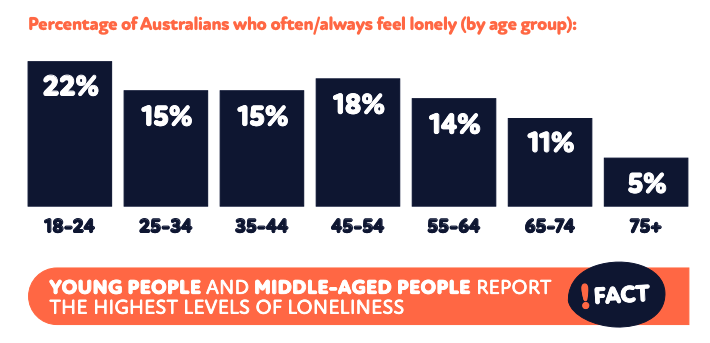
Loneliness is a feeling everyone can relate to, and it seems more and more people are feeling lonely almost all of the time, especially amidst the cost of living crisis and its effect on people not being able to afford seeing their loved ones.
Loneliness isn’t just social isolation or not seeing other people though — it’s the feeling of disconnection, or like your relationships do not satisfy your need for connection. So, you could be seeing a friend every day or living with your family and still be feeling lonely.
We know that loneliness can have serious negative effects on our health — it can be as deadly as smoking half a pack of cigarettes every day — and so it begs the question: should loneliness be treated as a public health issue by our government? One organisation thinks so.
Ending Loneliness Together is a not-for-profit Australian organisation that seeks to raise awareness about the harmful impacts of loneliness, and introduce ways to increase social connection and combat isolation.
According to ELT’s 2023 State of the Nation report, one third of Australians feel lonely some, or all, of the time. This number is higher than pre-COVID levels, and Aussies aged 18 to 24 are the most affected by loneliness (22%) — which surprised me personally as a 25-year-old, because I’ve grown up with the misconception that it is actually the elderly who feel the most lonely. The stats actually say the opposite.

The report found that men and women are equally lonely, and that loneliness is rife within all states but slightly higher in people who live in regional areas. People who are carers feel more lonely than others.
People who suffer from loneliness are 5.2x more likely to have poorer wellbeing in general, and 4.6x more likely to have depression. They’re also more likely to have chronic illnesses and other mental health issues.
The World Health Organisation (WHO) recognises loneliness as the next public health priority, and classes loneliness as a legitimate health risk. According to its research, loneliness leaves people 50% more likely to develop dementia, 25% more likely to die early and up to 30% more at risk of a stroke or heart disease.
Loneliness is, quite literally, giving us heartache.
It’s with this in mind that Ending Loneliness Together CEO Michelle Lim has called for the Australian government to do something about it.
She said there are “many different ways” the Australian government can invest in combating loneliness.
“[This] includes looking at policies that govern the way we live, work and play and also funding a peak body that can actually harness collaboration across all sectors to address loneliness within those sectors,” she told ABC News.
That being said, she also acknowledged that loneliness is a tough problem to solve, because it has so many factors that lead to it — and some of those are systemic.
“We know that loneliness is a whole systems problem … and even though it’s something that we do experience, all the time, it is actually incredibly difficult to resolve,” she said.
“We know that loneliness is an issue that cuts across all sectors so we’re reaching need a coordination of different sectors to comprehensively address loneliness through a prevention lens, but also through an intervention lens.”
While there’s no clear cut answers, there are certainly baby steps — like having a peak body or minister dedicated to the cause — that could help alleviate loneliness in the long-run.
And, of course, if our government actually did something about the cost of living crisis, that would help too. Lord knows I’d be able to focus on making more meaningful connections and travelling to see my loved ones if I could actually afford it.
Until now, we wait. And we check in with our friends.
- If you need mental health support, please call Lifeline on 13 11 14 or chat online.
- Under 25? You can reach Kids Helpline at 1800 55 1800 or chat online.
- If you require immediate assistance, please call 000



